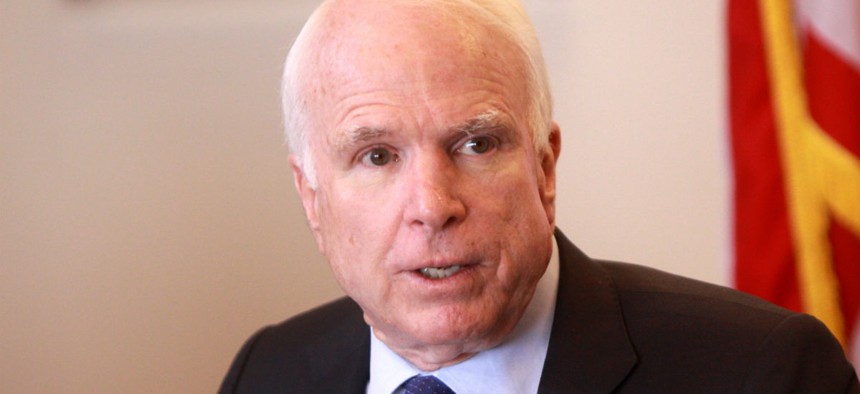
Sen. John McCain, R-Ariz. Flickr user Gage Skidmore
McCain Says He Will Scrap Change to Veterans’ Preference
Provision that would have limited the federal hiring advantage to a one-time use won’t be in final NDAA, says senator.
Sen. John MCain, R-Ariz., reportedly will scrap a provision in the Senate fiscal 2017 Defense authorization bill that would have limited veterans’ preference in federal hiring to a one-time use.
The senator, who is in a tough re-election fight in Arizona, sent the American Legion a letter earlier this week saying that he would make sure the provision, which he had supported, would not be included in the conference committee’s final NDAA bill. The American Legion in June sent lawmakers a letter urging them to oppose the measure, which would have applied governmentwide. The legislative language was not included in the House-passed NDAA.
“We appreciate Sen. McCain’s stalwart defense of an important benefit for all veterans who’ve served and sacrificed for their country,” said American Legion National Commander Charles E. Schmidt, in a press release on the group’s website. “We look forward to working with the chairman to ensure the final NDAA properly protects this earned benefit.” The organization issued an Oct. 4 press release on the development, quoting McCain’s letter, but would not provide the actual letter to Government Executive.
McCain’s office did not immediately respond to a request for a copy of the letter. The Washington Post first reported the story on Wednesday.
The provision, which was new this year, would not allow veterans’ preference – a confusing and often controversial factor in federal hiring – to be an advantage in any subsequent federal jobs that an eligible employee applies for. In other words, vets would receive the additional points that veterans’ preference confers during the application process for their first jobs in federal government, but not for any future positions within the competitive service. The measure also would affect certain close relatives of veterans, including spouses and parents, who are eligible for veterans’ preference under specific circumstances when applying for federal jobs.
Many opponents of the provision believed the change would hurt the government’s veteran recruiting and retention efforts, and hamper a system that was designed to hire and promote more veterans in federal service. Rep. Ruben Gallego, D-Ariz., a veteran of the Iraq war, introduced an amendment in the House-passed fiscal 2017 financial services spending bill that would prohibit funds from being used to change the current policy on veterans’ preference in federal hiring – a direct response to the Senate NDAA provision.
“While this change might seem innocuous, it could have serious negative implications for the men and women who served our nation in uniform,” Gallego said in July during remarks on the House floor.
Many hiring managers, human resources specialists and veterans do not understand how vets’ preference works in federal hiring. It’s played a role in complaints filed over whether the benefit -- designed to help former service members find jobs and increase diversity in government – was applied fairly. Veterans and non-veterans have complained about being shut out of government service because of it.
Veterans made up about 31 percent of the federal workforce in fiscal 2014, according to the Office of Personnel Management. The American Legion said research from VetAdvisor and Syracuse University’s Institute for Veterans and Military Families revealed that two-thirds of vets switch jobs in the first two years of employment.
NEXT STORY: How to Write the Perfect Email







